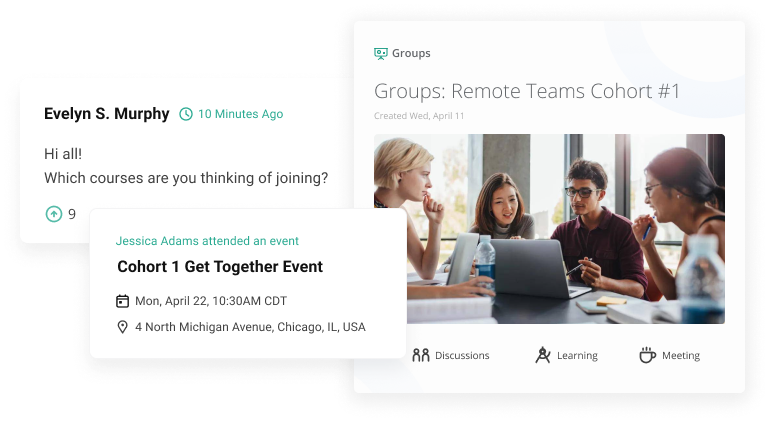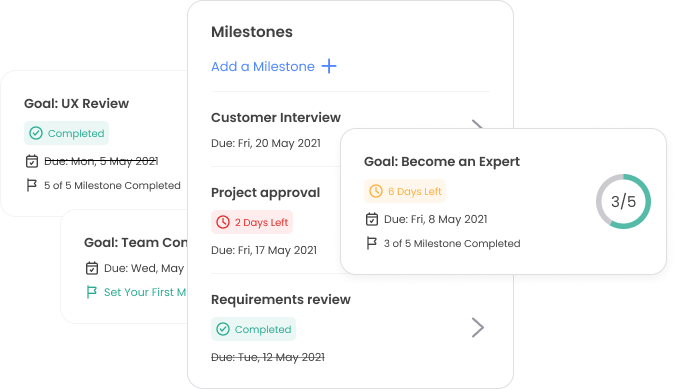Role of Mentoring Software in Enhancing Communication & Collaboration
 Omer Usanmaz
·
5 minute read
Omer Usanmaz
·
5 minute read
In the contemporary rapid-paced, and frequently hybrid workplace environment, robust communication and seamless collaboration transcend mere buzzwords; they are essential components for achieving team success, fostering employee engagement, and ensuring sustained performance. However, numerous organizations continue to struggle with existing silos, ambiguous roles, and fragmented departments, all of which impede effective internal communication and cooperation.
That’s where structured mentorship and a comprehensive mentoring platform like Qooper come in. When powered by a smart, scalable, and customizable mentoring platform like Qooper, the mentoring process evolves from a nice-to-have initiative into a critical part of your employee communication, collaboration strategy, and employee development program.
By intentionally connecting employees across pivotal roles, departments, and seniority levels, Qooper cultivates a dynamic environment where people share valuable insights, sharpen communication skills, and work toward mentorship goals and career goals together. Whether it’s breaking down silos or creating new channels for knowledge transfer, Qooper helps organizations strengthen their mentoring culture and culture of collaboration from the inside out, even in distributed or hybrid teams through advanced communication platforms.
Mentorship Communication Plan Template – Create structured, aligned mentorship communication with ease.
How can mentorship bridge gaps between teams?
In many organizations, teams often work in isolation, leading to communication breakdowns, duplicated efforts, and missed opportunities for innovation. Mentoring strategies are a powerful tool to bridge these gaps by creating intentional and meaningful connections across departments and roles.
Corporate mentoring programs, especially when run on enterprise mentor software platforms like Qooper, facilitate cross-functional collaboration that might not happen otherwise. When mentors and mentees come from different teams, they bring unique perspectives, knowledge, and experiences to the table. This exchange helps break down silos, increases mutual understanding, and fosters empathy between colleagues who might otherwise rarely interact.
Moreover, mentorship builds trust and openness. As employees engage in regular, purposeful conversations, supported by a variety of communication tools such as video conferencing, they become more comfortable sharing challenges and exchanging ideas beyond their immediate teams. This openness is crucial for internal communication, as it encourages active participation, knowledge sharing, and joint problem-solving.
By promoting shared goals and structured communication through mentorship, organizations create a more cohesive work environment where teams align better with broader business objectives. In essence, mentorship acts as a critical feature, connecting people, ideas, and efforts so the entire organization moves forward stronger and more united.
Smart Matching That Sparks the Right Conversations
One of the most powerful key features of Qooper Mentoring Software is its smart mentor-mentee pairing engine. This proprietary matching algorithm pairs employees based on shared interests, learning objectives, mentoring goals, career trajectories, and employee growth areas, laying the groundwork for meaningful connections that benefit individuals and the broader team alike.
Unlike traditional networking or informal buddy systems, these matches are built with intention. When employees from different roles and departments connect through structured mentoring, they unlock new opportunities for cross-functional collaboration and enrich their professional development journey.
These relationships go beyond skill development, they reveal hidden synergies, uncover high-potential employees, and foster organization-wide alignment. It’s one of the most effective ways to boost employee engagement, improve employee retention rates, and connect departments that traditionally operate in silos.
Discover how Qooper’s smart matching creates powerful mentoring connections
Guided Conversations to Build Communication Skills
Starting a mentoring relationship can feel intimidating, especially for new mentees or first-time mentors. That’s why Qooper equips mentoring pairs with guided conversation templates, prompts, and real-time feedback tools to help navigate early interactions with clarity and confidence.
This structure encourages honest dialogue around career development, challenges, and growth opportunities. Over time, participants develop essential communication skills like active listening, constructive feedback, and having courageous conversations.
These competencies ripple through the organization: mentors become better leaders, mentees gain confidence, and everyone benefits from stronger internal communication across meetings, projects, and one-on-ones.
In essence, Qooper turns mentorship into a mentorship experience that nurtures leadership development, human connection, and continuous learning—key pillars of modern workplace success.
Driving Collaboration Through Shared Goals and Check-Ins
Mentoring programs are most impactful when they’re goal-driven. Qooper Mentoring Software makes it easy for mentoring pairs to set, track, and revisit shared objectives, whether focused on new leadership skills, advancing career growth, or improving performance in a specific role.
With built-in tools for goal setting, progress tracking, and automated check-ins, Qooper creates accountability on both sides of the mentoring relationship and fosters continuous improvement.
This structure helps employees stay aligned, engaged, and committed to mutual success. And when goal-setting becomes routine, it naturally strengthens team collaboration and project execution.
In short, shared goals fuel shared success, and Qooper’s comprehensive mentoring platform ensures teams stay aligned every step of the way.
Building Peer Networks and Breaking Silos
Mentorship doesn’t have to be limited to one-on-one relationships. Qooper also supports group mentoring, peer mentoring, and virtual mentoring formats, allowing employees to build broader networks of learning, connection, and collaboration.
These formats are especially effective for employees facing similar challenges or working toward shared professional goals. Whether it’s a cohort of aspiring leaders or a circle focused on upskilling, these mentoring activities foster empathy, team dynamics, and a sense of belonging.
Over time, these informal peer networks help employees:
- Collaborate more effectively in cross-functional teams
- Understand other departments better
- Strengthen interpersonal relationships
- Feel a stronger sense of purpose
All of which contribute to inclusive cultures, employee satisfaction, and long-term employee engagement.
Measurable Impact with Engagement Analytics
To build a truly scalable and effective mentoring program, you need visibility—and that’s where Qooper shines. Its reporting features and data-driven insights give HR, L&D, and D&I leaders the ability to monitor and optimize the mentorship process.
- Participation rates
- Communication frequency
- Interaction frequency
- Goal progress
- Program outcomes over time
These insights help leaders make informed decisions, close skills gaps, and strengthen the link between mentoring programs and business results.
Mentorship, when paired with detailed reporting, becomes a strategic business driver that supports long-term success, employee experience, and program success.
Mentoring Program Reporting Template
Conclusion: Why Communication-Driven Mentorship Matters
The future of work is built on collaboration, and collaboration can’t happen without strong communication. With Qooper’s advanced features like intelligent mentor-mentee matching, guided conversations, shared goals, training materials, and engagement analytics, mentorship becomes a seamless experience and an essential tool for:
- Cross-functional knowledge sharing
- Team alignment and engagement
- Leadership development
- Personal growth and development
- Program management in corporate settings
The result? A workplace where hundreds of organizations see employees grow together, build relationships between mentors, and navigate challenges head-on using effective feedback mechanisms and support from a customer success team.
Key Takeaways
- Mentorship fuels communication and collaboration: Structured and successful mentoring programs help employees build essential communication skills and collaborate more effectively across departments.
- Smart matching drives meaningful relationships: Qooper’s mentoring software intelligently pairs experienced mentors and mentees based on goals, interests, and career paths, laying the foundation for long-term professional growth and engagement.
- Guided conversations boost confidence: With templates and prompts, mentors and mentees can have focused, impactful discussions that sharpen their ability to give feedback, listen actively, and navigate professional challenges.
- Goal-setting enhances teamwork: Shared goals, check-ins, and progress tracking keep mentoring relationships focused and aligned, supporting accountability and team performance.
- Peer mentoring breaks down silos: Beyond one-on-one mentoring, Qooper supports peer and group mentoring to build strong cross-functional networks and foster a culture of knowledge sharing.
- Analytics provide measurable impact: Engagement analytics give leaders visibility into how mentorship programs are working and where communication and collaboration can be improved.
Frequently Asked Questions
How does mentoring improve communication and collaboration in the workplace?
Mentoring programs, especially those powered by platforms like Qooper, connect employees across roles and departments, helping them develop communication skills, share knowledge, and collaborate more effectively toward common goals.
What makes Qooper’s mentoring software different from other tools?
Qooper uses smart matching, guided conversation templates, goal tracking, and real-time analytics to make mentoring programs structured, scalable, and aligned with organizational communication and collaboration strategies.
Can mentoring programs break down silos between teams?
Yes. Cross-departmental mentoring relationships, peer mentoring, and group sessions enable employees to connect beyond their usual roles, fostering a broader understanding of the organization and improving teamwork across departments.
How do analytics help improve mentoring outcomes?
Qooper’s analytics dashboard tracks engagement, communication frequency, goal progress, and program performance, giving HR and L&D leaders valuable insights to refine strategies and boost the impact of mentorship on employee development and team collaboration.
Is Qooper suitable for remote or hybrid teams?
Absolutely. Qooper is designed to support communication, collaboration, and organizational goals in remote, hybrid, and in-office environments, making it easy for employees to connect, mentor, and grow, regardless of location.





-Jun-30-2025-07-18-15-3535-PM.jpg)
-4.jpg)
-2.jpg)